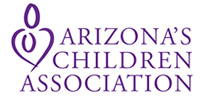Written by Mary Duncan, AzCA’s Employee Learning & Development Coordinator
According to the US Department of Justice, six in ten US youth are exposed to violence in a given year. Over 90% of people served by human service agencies have survived trauma. Both children and adults need healing in order to lead full and happy lives.
For this reason, many agencies have implemented a set of principles, values, and practices known as trauma-informed care. Being a trauma-informed agency means creating a culture in which staff and clients are supported and respected 100% of the time. It means working intentionally to create an environment that is safe, supportive and healing to survivors of trauma and where staff’s physical and emotional well-being are prioritized.
At minimum, trauma-informed care implores agencies to ensure trauma survivors are not caused physical or emotional harm, even unintentionally, but in its truest sense, trauma-informed care is about treating everyone with a level of care that maximizes healing and safety. Trauma-informed care is about acknowledging that someone’s challenges could likely be a result of their hurtful life experiences, not a deficiency that they have. In other words, it’s not about asking the question “what’s wrong with you;” instead, it’s about understanding “what happened to you?” When individuals are asked the right questions in a sensitive, nonjudgmental manner, they begin to feel empowered to address their trauma and how it has shaped their life, and from there they can begin to move forward.
Arizona’s Children Association (AzCA) has the mission of protecting children, empowering youth, and strengthening families. We understand that the fulfillment of our mission requires all employees to work together to create a positive working environment, and to ensure that trauma survivors are able to self-advocate and are supported through their healing process in a way that prevents unintentional re-traumatization. We encourage each person’s growth through staff initiatives, programs and services that meet an individual’s unique needs.
AzCA participated in the National Council for Behavioral Health’s Trauma Informed Care Learning Community in 2017 and implemented a number of measures to strengthen our agency’s position as a trauma-informed agency. All staff are trained in trauma-informed care, regardless of their specific role or capacity within the agency. This is necessary in order to create a culture in which healing, respect, and physical and emotional safety are at the forefront. Staff are encouraged to interact with each other and clients with respect and dignity at all times. Furthermore, at AzCA, attention is paid to the physical environment so that our physical spaces, such as the reception areas, feel welcoming, safe and inviting rather than intimidating or uncomfortable. We ensure that our policies and procedures are trauma-informed so that staff and clients can have the best experiences possible. Staff also hold the attitude that trauma-informed care is paramount and the belief that they play a vital role in a creating a safe and healing environment for clients and colleagues.
So, how can you “do” Trauma Informed Care? Here is a list of practices that we can all incorporate into our daily lives:
- Directly acknowledge and greet others you see, by name if possible. Make eye contact, if appropriate.
- Practice effective self-care.
- Remember that all behavior has meaning and meets a need.
- Allow others to be and feel heard.
- Remain calm, patient, and kind.
- Be helpful towards others.
- Be aware of your own non-verbals and your mood.
- Adopt a “person first” perspective to avoid describing someone by their behaviors/diagnoses.
- Take the time to explain expectations clearly and calmly.
- Adjust practices/expectations/behavior as appropriate to meet someone’s unique needs.
- Never sacrifice caring and compassionate treatment for meeting productivity standards.
Trauma Informed Care is embedded in who we are as an agency. It takes everyone to make the difference! At AzCA, everyone is important – we all play a valuable role in assisting others as they heal and make progress in their lives.
To learn more about AzCA’s trauma-informed services, click here.


